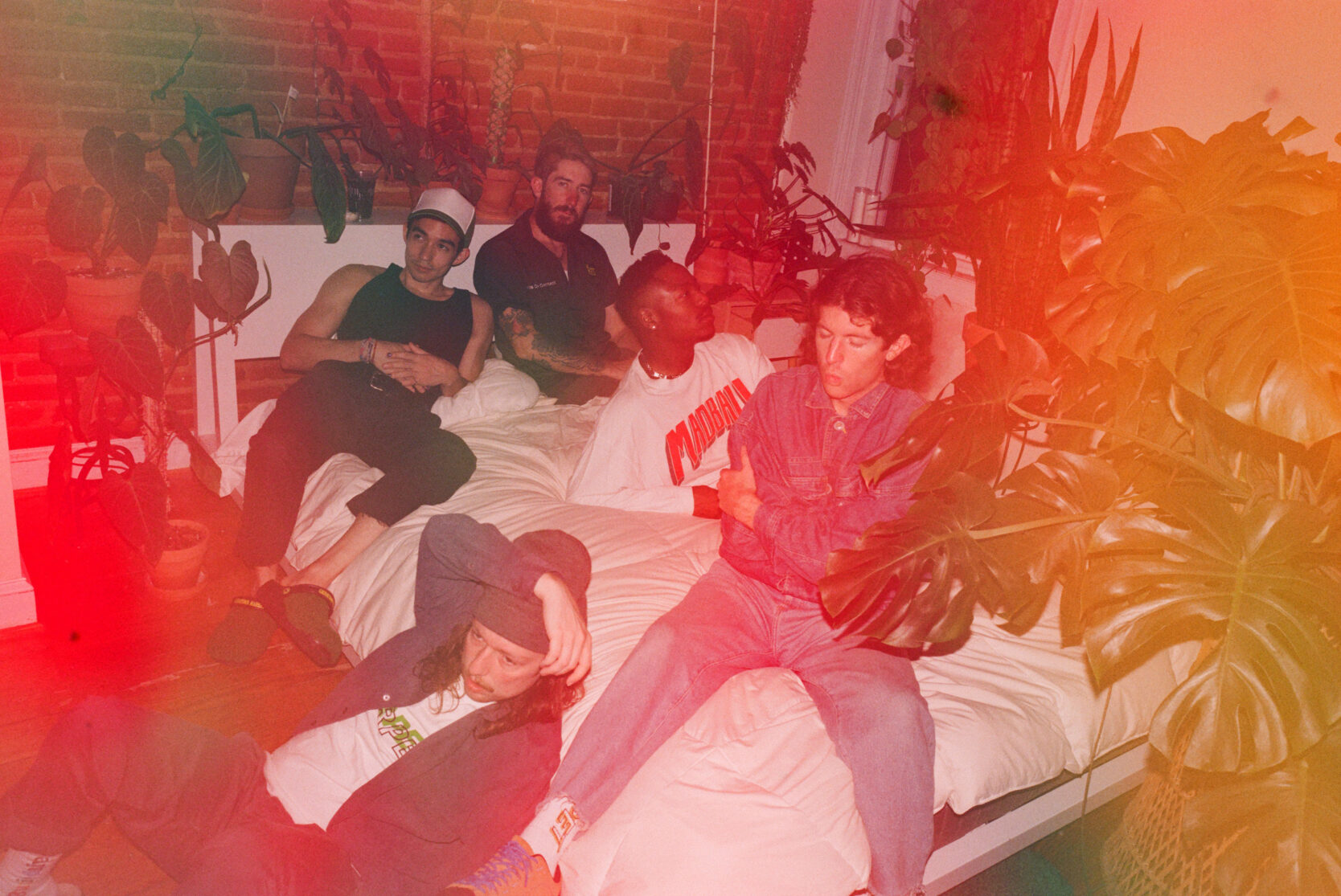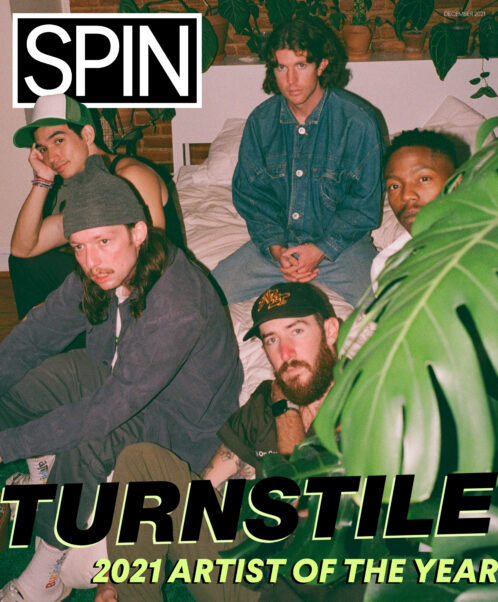It was 7:45 on an unseasonably chilly Sunday evening in November, but the roaming packs of streetwear kids and hip-hop fans alike were starting to show signs of wear. Many had just survived six straight sets of various subgenres of rap from the likes of Night Lovell, Ramirez, Shakewell and more on the Grey Day Tour over the previous three hours — and some were even on the second day of the weekend-long mini-festival headlined each night by SoundCloud rap duo $uicideboy$.
The night air was damp with sweat and body heat as a few dozen members of the almost-uncomfortably packed crowd decided they’d had enough, vaulting themselves — some more gracefully than others — over the barricades to either side, escaping the primarily maskless masses. After all, there was only one more act before $uicideboy$ came on, and it would take some time to get enough feeling back in their legs to hobble over to the bank of port-a-potties (and/or grab a $17 Stella Artois) before cutting back into the sea of black hoodies and dad hats.
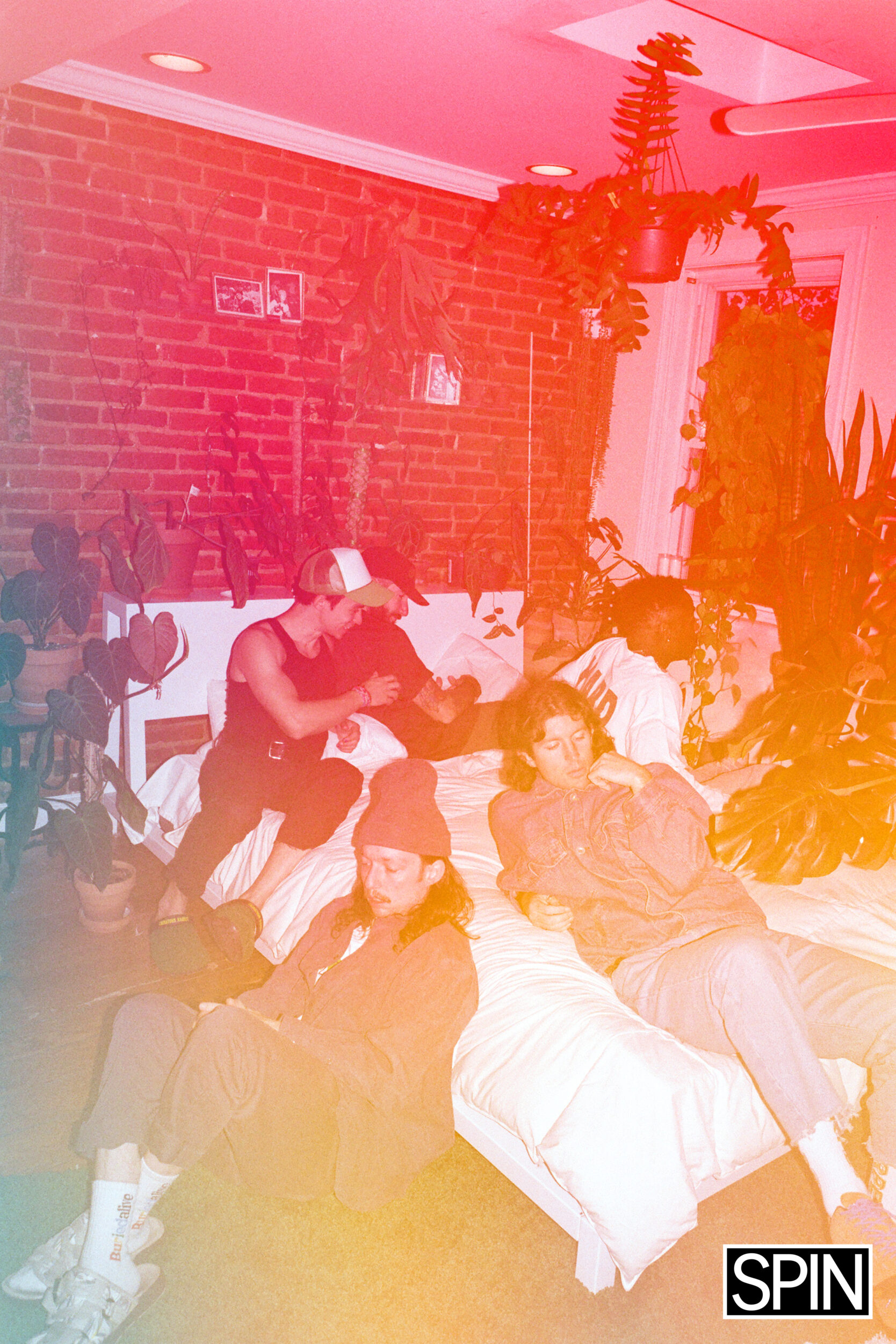
As the stage lights dimmed once more and “Where Is Love?” — the soul/funk closer on the Equatics’ 1972 record, Doin’ It!!!! — played over the speakers, a quiet roar came from the crowd. At most 100 attendees near the centermost portion of the stage broke out into hearty cheers. A few older white guys (and the handful of ladies they were trying to impress) in leather jackets, too-tight jeans and other attire from the “middle-aged rock and roll guy” collection began hollering from the VIP section off to the side while awkwardly attempting to film the stage on outdated iPhones. But for the most part, everyone else just kind of stopped to stare at the stage as five friends from Baltimore walked out with their instruments.
There are a lot of times when Turnstile’s unique brand of dance-worthy, shoegaze-infused hardcore punk is expected by rabid fans gathering in front of a stage, but this wasn’t one of them.
The spacey intro to “MYSTERY” didn’t help clarify things for the crowd either, but 20 seconds later when the guitars kicked in — followed by Daniel Fang’s explosive drums and eventually Brendan Yates’ signature melodic nearly-screaming-but-not-quite vocals — it became pretty clear who was and wasn’t willing to put aside genre preferences to groove with one of the planet’s best rock bands.
Between Yates’ early-career Anthony Kiedis vibes (albeit with different hair and way fewer off-stage issues) and oversized white shirt — which reads “PRAISE” across an illustrated version of the Earth, accompanied by the sun and moon — along with a pair of bucket-hat-wearing members, Turnstile could be visually mistaken for any number of festival-worthy rock acts from the ‘90s, 2000s, or today. But with their combination of undeniably catchy yet complex rock and modern genre-less sensibilities, Maryland’s (likely) best band ever is painted a shade all their own.
While some $uicideboy$ fans were initially reluctant, more than a third of the crowd was at least trying their hand at headbanging by the end of Turnstile’s raucous 25-minute set. As they smashed and danced their way through a handful of caps-locked tracks from August’s Glow On (“BLACKOUT,” “UNDERWATER BOI,” “HOLIDAY,” and “T.L.C. [TURNSTILE LOVE CONNECTION]”) and a few older tunes (“Drop,” ''Real Thing,” and “Big Smile”), more and more clapping hands and pumping fists raised from the previously baffled Gen Z army in front of them.
It might not have been quite the relentless, crowd-surfing mosh pits that followed them on their nine-stop headlining trek behind Glow On a couple of months prior, but converting nonbelievers into Turnstile fans is part of what the band does best.
“My grandma called me up to tell me how much she likes specific songs [from Glow On] and the lyrics,” Fang chuckles over the phone interview a few weeks after the L.A. show. “My old college roommate told me that he and his hometown buddies have been jamming the record for a while too. It's been shocking and overwhelming, but in the best possible way.”
It isn’t just the drummer’s family and friends who’ve recently taken more notice of Turnstile recently. After a decade as a band — and two albums that were about as commercially successful as hardcore punk can expect to be these days (2018’s Time & Space topped Billboard’s Heatseekers chart, although they didn’t hit the Billboard 200 until this year, peaking at No. 30) — Glow On took Turnstile to another level.
Maybe it was the unintentionally perfect timing of its August 2021 release, when venues were re-opening and much of the country was ready to let loose after 16 months locked down. Maybe it was the album's exploratory, genre-bending tones, expanding beyond their earlier, more straightforward work. Or it could be that Glow On was just a near-flawless rock album pushed into the world when a lot of people really, really needed an incredible 15-track eruption to help blow off post-lockdown steam.
Whatever the case, Glow On hit people from all across the rock universe — from metalheads to emo kids — in ways that few albums do. It received near-universal acclaim upon release (including the coveted “Best New Music” designation from Pitchfork), and it’s now ended up on virtually everyone’s “Best Albums of 2021” lists. In an industry that can never agree on anything, SPIN, Rolling Stone, Billboard, Pitchfork, Paste, Revolver, and several other major publications all named Glow On one of their favorites of the year, with many of them landing it in the top 10.
Of course, none of the awards or praise seem like they really matter to the band’s 30ish-year-old rockers. Turnstile has always been about the group of friends creating the music they want to make, and if other people happen to enjoy it and want to spread the word, well, that’s cool too.
“It's always nice to have different people reaching out or finding the band through things like [year-end lists],'' Yates says with a mellow deadpan that couldn’t be more different from the energy he exudes on the stage. “It's exciting. It's cool to have that kind of reach, I guess, but I think we'll always kind of just do what we do. I always appreciate anything like that, though. It's cool.”

Also Read
The 50 Best Rock Bands Right Now
“It's a big honor when [recognition comes from] a publication any of us read because we never thought we'd see our name in those pages,” Fang adds. “It's really fun, but we’ve never really attributed a lot of value to it. The most exciting part about it is just being able to show it to our parents, and they’re like, ‘Oh, OK, so what you've been doing does have some value… You've been doing something right.’ When my grandma or my mom opens up our hometown newspaper and gets surprised with our name in a headline, that feels really good.”
Part of the reason that Glow On’s success doesn’t seem to have changed the band much is that everyone involved feels like they just did what they’ve always done. The chugging guitars, wide vocal range, and spacey electronics on tracks like “UNDERWATER BOI” — which features an unexpected vocal appearance from singer-songwriter Julien Baker — may not have fit perfectly into either of Turnstile’s first two albums, but they’re also not an unexpected shift for a band that generally defies labels and scenes. While critics and fans may hear brand new elements and refined old ones on the Mike Elizondo-produced album, its mid-pandemic creation process wasn’t anything different than what they’d done in the past.
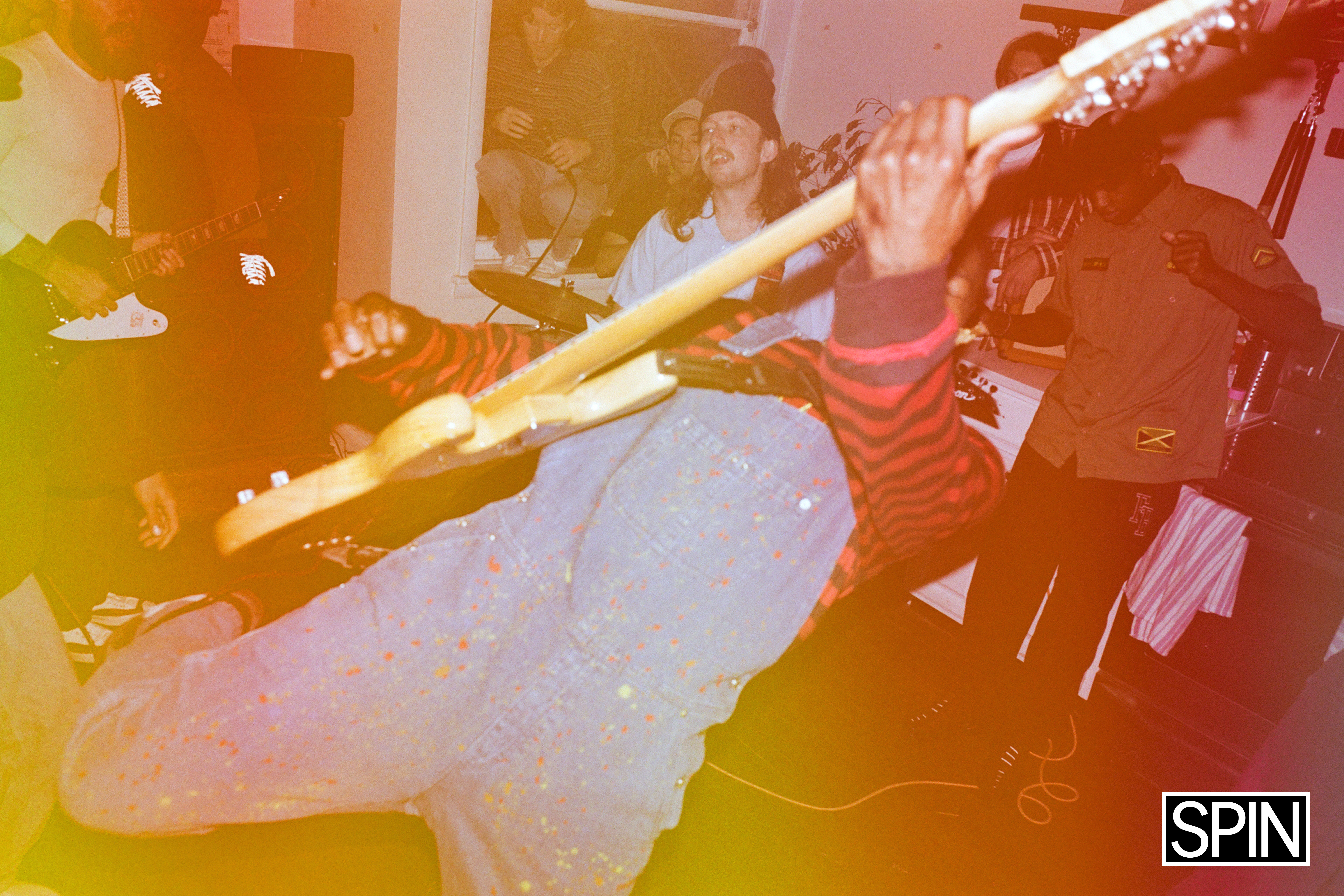
“I think we never intentionally try to expand [Turnstile’s sound],” Yates says. “Everything is just a reflection of what we really want to do, so it's always felt the same. We always leave the door open for endless possibilities when it comes to making a song or trying things. If a song feels good, we just kind of let it happen. That process has always been the same for us, and I think this record was the result of that.”
“Personally, I feel like we've been doing the same thing for a while,” adds bassist Franz Lyons, matching — or possibly exceeding — Yates’ easygoing tone. “But if I take a step back, it's like we patiently took steps to get to where we are, sonically and musically. I think it’s just the confidence we have in all of the people around us. Everybody involved in what we're doing right now is either inside of our very tight circle or like one step away. Everybody is just really, really creative and speaks the same language.
“This record to me is like if you put a kid in the sandbox — they're gonna play,” Lyons continues. “When we went to work with [Elizondo], he had all kinds of analog everything, so you can interpret a bass line or anything else with unlimited sounds. With that amount of resources. of course you'll have a bold new adventure.”
For as nonchalant as Yates, Lyons, and Fang are about the critical acclaim they’ve picked up this year, one thing they certainly aren’t taking for granted is being able to play live again. Even before they hit the road, Yates recalls attending a show and just feeling a “different level of excitement.” While the guys may feel as though they’re the same ol’ Turnstile that they were on Time & Space, 2015’s Nonstop Feeling, and the handful of EPs they released in between, they’ve definitely noticed how the music world has shifted after live shows disappeared for more than a year.
When the band — rounded out by guitarists Brady Ebert and Pat McCrory — finally went on tour prior to releasing Glow On, that change could be seen almost immediately. Fans were more passionate than they were before. They knew more words to more songs than they did prior to lockdown. People just wanted live music more than they did before, both from Turnstile and in general.
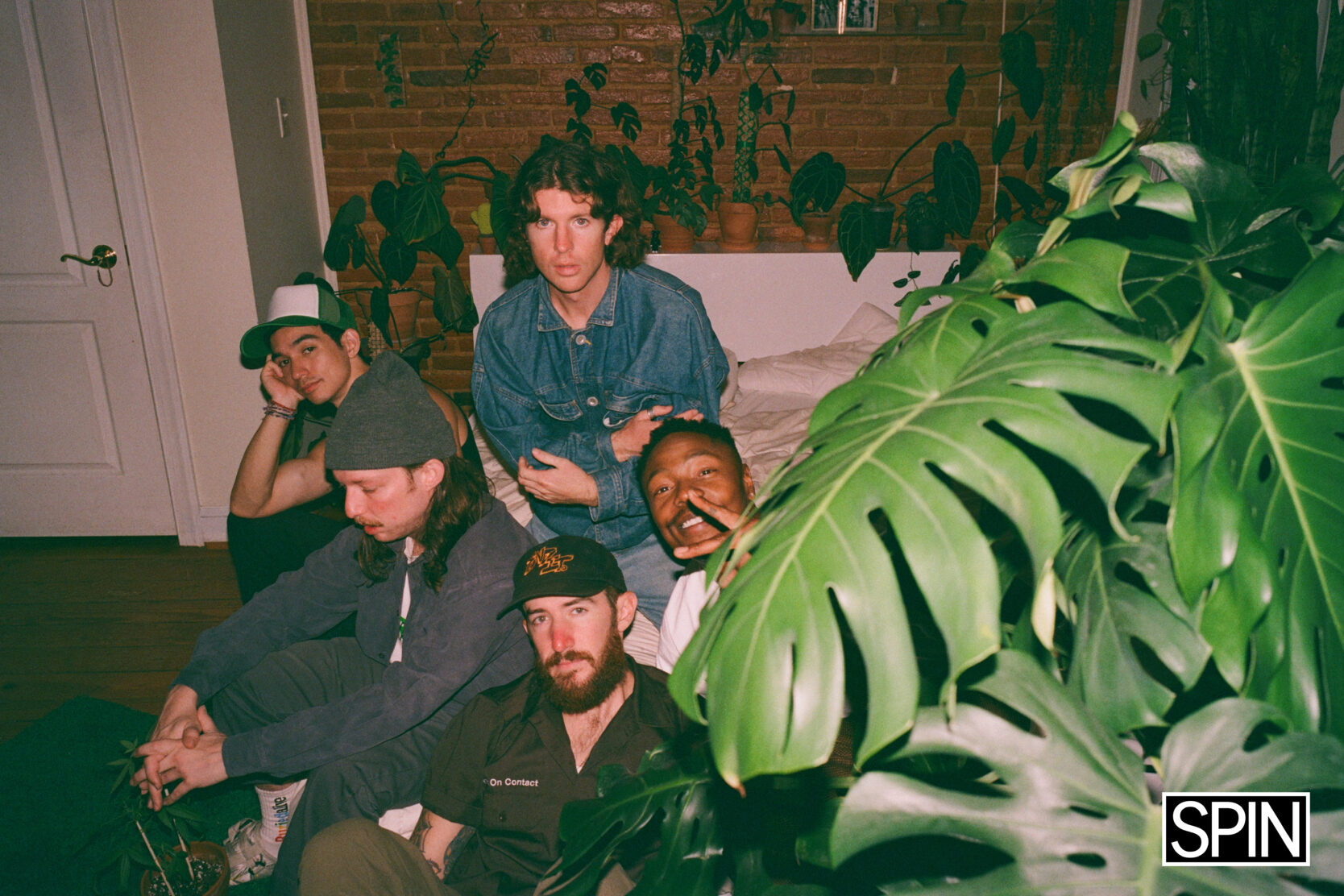
And a lot of that desire for concerts matches up perfectly with the band themselves. Glow On works so well because, while its production is obvious, it has a certain raw attitude that channels flawlessly into the emotion of a live performance. The guys in Turnstile generally never feel at home as much as they do on the stage, and it shows every time the house lights dim. That’s the reason they had no problem joining a bill of nearly a dozen rap acts for their fall tour — and it’s also why they had no hesitations about opening for A$AP Rocky at ComplexCon in Long Beach, CA, hours before their aforementioned set in L.A.
For a lot of bands who go all out as hard as Turnstile does on stage — perhaps nothing out of place in the hardcore or punk scenes — performing three times in two cities over the course of 24 hours is a hard sell. Even if you get out of the first two completely unscathed, having the energy and willpower to blast through multiple full sets in a day isn’t exactly what many established acts are signing up for.
But for Turnstile, that challenge was just where the fun began.
“It was just one of those things that kind of naturally happened, and we just took it as a challenge,” Yates says, pausing to think back to the exact day. “Both were just totally different experiences, and I feel like that kind of stuff is just rewarding for us to be able to step outside of our comfort zone a little bit and try different things.”
“Everyone felt confident that it could work, so at that point, it's just about having a good time,” Fang adds. “We were able to dive deep into this very different world of ComplexCon — which was like a trade fair — and then go back to the tour that we had been playing on for a couple of months. I think there’s a solidarity that everyone has in the band, having done some physically strenuous runs in Europe and abroad with flying every day and being sleep-deprived. We're very used to just doing whatever we need to do and having a blast doing it. Honestly, I kind of loved it. I wish we had more of those two-shows-in-one-day things.”
While the punk rock mentality of being ready to play anywhere at any time may be part of Turnstile’s core ethos, their musical tastes and influences go far beyond the names expected from a millennial hardcore/shoegaze band. Aside from Baker’s appearance on “UNDERWATER BOI,” Blood Orange’s Dev Hynes provides vocals on three tracks, with both “ALIEN LOVE CALL” and “LONELY DEZIRES” prominently featuring the R&B veteran.
On one hand, the inclusion of Hynes may be surprising for a band that, on the surface, sounds like a modernized fusion of Rage Against the Machine and Jane’s Addiction. But for those who understand the breadth and depth of the band’s tastes, it made perfect sense to bring in the artist known for collaborating with the likes of Solange, Mac Miller, Mariah Carey, and HAIM.
“I’ve been such a big fan [of Hynes] for a long time,” Yates says, a spark of excitement entering his voice. “There was an opportunity to work on music together, and it just felt really special and very appropriate for the songs that he was on. It just kind of happened, and I'm super glad it did. It was such a great experience for me and for the band to be able to collaborate with someone that we admire so much.”
Perhaps Hynes’ involvement is ultimately the key to understanding Turnstile’s appeal. Yes, they’re an incredible rock band. Yes, Glow On would likely be among the best rock albums of the year regardless of which year it was. But ultimately the most punk rock thing about the band is that they create and release the music they want to hear, never worrying about genre or who’s going to say something about it.
They don’t care about Glow On’s success because it’s the exact same album they would’ve released and toured on even if it was universally panned. They’re perfectly willing to open for SoundCloud rappers between headlining tours — as long as they’re able to get on stage and perform, it doesn’t matter if 300 or 3,000 people are going wild with them. They’re borderline nihilistic in their approach to the industry and deeply passionate about both their music and visual branding — and that speaks volumes that don’t rely on carefully labeled subgenres or algorithmic placements.
While that attitude wouldn’t carry Turnstile too far without their complex yet anthemic tunes, it speaks to a generation of kids (and some adults) who are tired of being fed the same formulaic music put forth by record labels in an attempt to top the charts. That gritty “underground” connection is why they’re seamlessly able to incorporate artists like Hynes and Baker when other bands wouldn’t be able to pull it off, and also why Turnstile pretty unanimously agreed that the $uicideboy$ tour wouldn’t waste the second leg of their album cycle.
“It felt like the kids coming out to those shows were looking for something underground, new, interesting, and I think just very much not mainstream,” Fang says. “I think you have this type of alternative fan base that feels a lot like what I was getting into when I was a teenager going to punk shows. It might be a different sound and a different aesthetic, but a lot of these kids are coming out with the same attitude of looking for something cutting edge and exciting. It feels like there's a strong parallel to what we're doing.”
“A lot of kids on that tour had never seen a concert with instruments before,” Lyons adds. “Even that in itself is a lot to take in. They’d go to the concert to see their favorite rappers, and then there's a five-piece band screaming music at you. A lot of times I would see people just letting the music pass, but then halfway through the set — whether they actually liked it or not — the rhythm, the groove, and especially the energy of what was going on right in front of them put them in that moment, and they were down with it.”
“We always embrace the challenge of doing things that we've never done before, because then we never feel like we’re repeating anything and always have the possibility of playing to new people and making new connections, with music leading the way,” Yates says. “On a lot of the festivals and things we do where we're a fish out of water a little bit, it's always rewarding for us to be able to never necessarily stay in one place. I like to flit around and play different opportunities.”
For most hardcore and punk acts, being “a fish out of water” means playing the one air-conditioned stage at Coachella or joining another giant pop-friendly music festival, not going on a full tour with a bunch of rappers immediately after the release of an immensely popular album. But that’s not Turnstile. It never has been, and likely never will be. There’s nothing they like better than defying expectations and keeping people — particularly themselves — on their toes, and it’s brought about a tremendous growth for a band that had already pretty much secured themselves among the current hardcore and punk rock elite.
We don’t need to go deep into the band’s history or collective personalities, as SPIN’s 2018 cover story for the release of Time & Space did plenty of that. Frankly, Turnstile’s past is almost irrelevant to who they are in a post-pandemic world — one that’s embraced the intricacies of Glow On regardless of age and genre preference. The audience that’s been with them since Nonstop Feeling (or even their previous EPs) isn’t going anywhere. But there’s a whole new crowd of grandmas, former college roommates, hip-hop kids, and more who are discovering one of the world’s best rock acts for the very first time.
And that’s enough to make them SPIN’s Artist of the Year.

